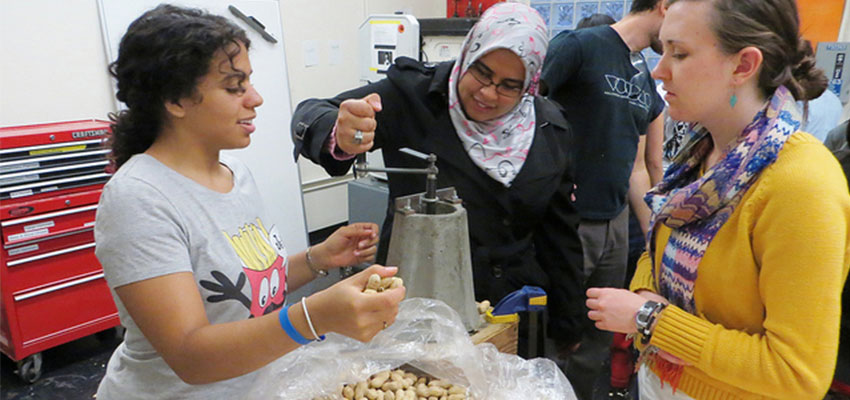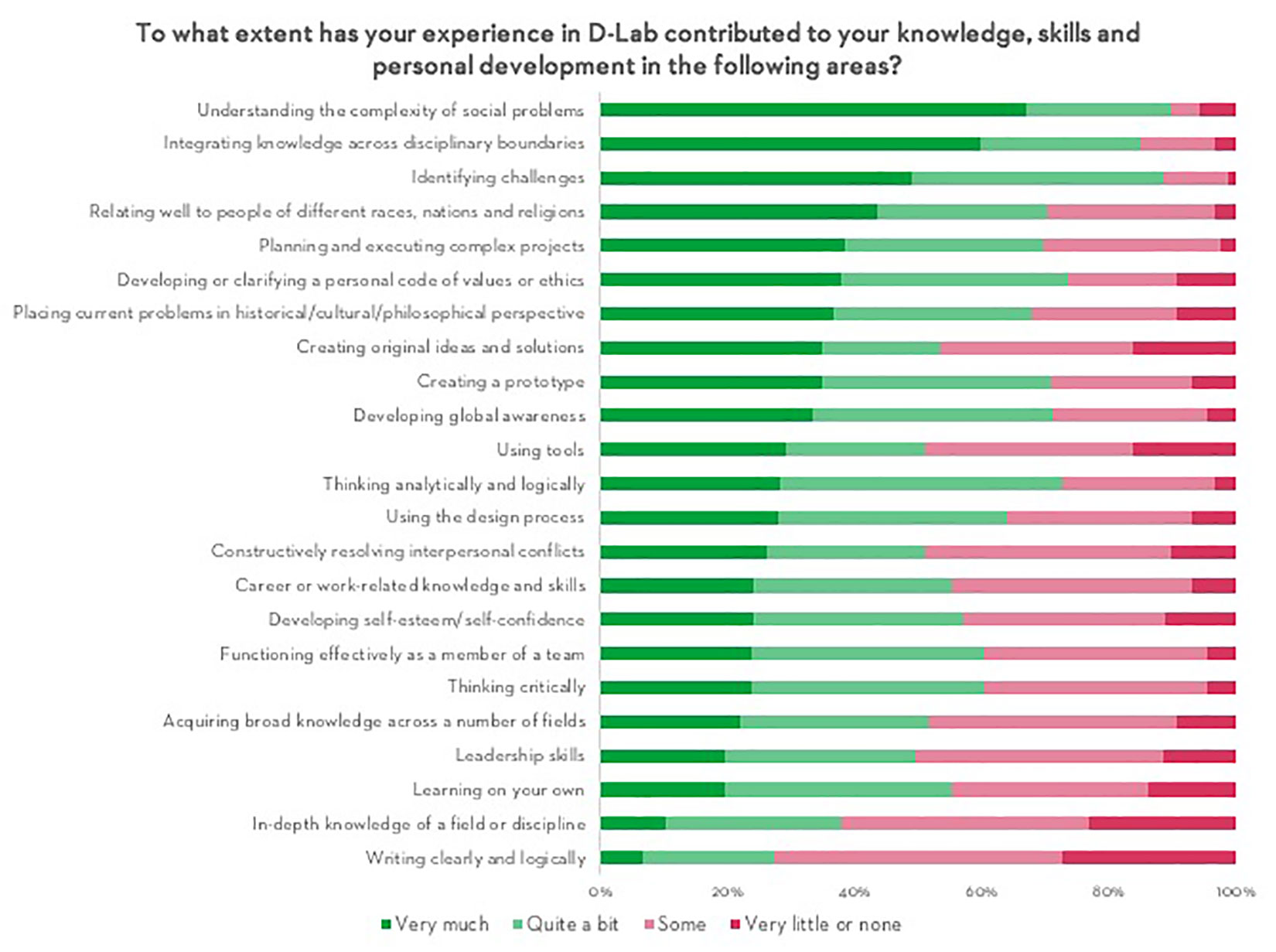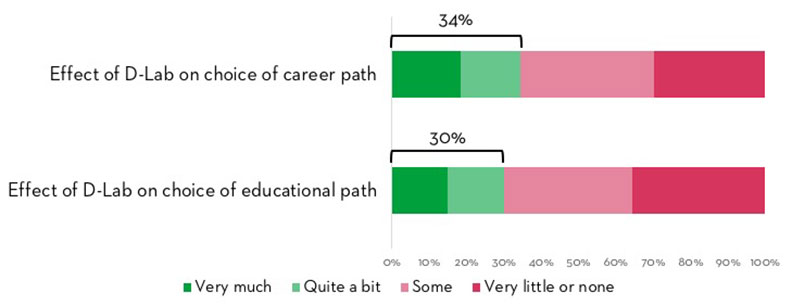
"These results indicate that MIT D-Lab is fulfilling one of its primary educational goals: inspiring students to be global agents of change in their personal and professional lives."
Since 2002, over 2000 students have engaged with MIT D-Lab engaging in hands-on learning in courses, participating in UROPs (undergraduate research opportunities), and working in the field with community partners. As D-Lab turned the corner on its 15th anniversary in 2017, we realized we had an unmatched opportunity to reach out to this group and learn how D-Lab may have influenced their trajectory post-MIT. What had D-Lab alumni taken away from their experience at D-Lab? What had they done since graduation, and how had D-Lab influenced those actions? And what are D-Lab’s strengths and weaknesses, from the alumni perspective?
In the hopes of answering these questions, D-Lab began working with a team of external evaluators from Purdue University. In summer of 2017, the Purdue team designed and sent out an online survey to 1,194 D-Lab alumni.
Out of the alumni e-mailed, 114 took the survey, for a 9.5 percent response rate. Eight alumni who took the survey were also interviewed over the phone. Although the sample was small, it was representative of D-Lab alumni with respondents who had participated in D-Lab as early as 2002 and as recently as 2017, and demographics that matched the makeup of D-Lab students today (73 percent female, 74 percent undergraduate, about 32 percent international students, and representing a breadth of majors, with the most common being mechanical engineering).
Here is what they told us:
1. Respondents were overwhelmingly satisfied with their D-Lab experience. D-Lab’s people, projects, and global opportunities seem to have had the strongest effect on this high level of satisfaction.
Overall, 93 percent of respondents were satisfied with their D-Lab experience (60 percent “very satisfied,” 33 percent “generally satisfied”), and 91 percent rated the quality of education at D-Lab as above satisfactory (64 percent “very good,” ”27 percent “good”).
Alumni attributed their satisfaction to the people, projects, and global opportunities accessible through D-Lab. In their open-ended responses, they emphasized the value of hands-on experiences solving real-world problems, gaining a global perspective through travel and intercultural learning, and understanding practices in global development.
“I valued the camaraderie at the time. I definitely valued the opportunities to do things more from a hands-on perspective, and from a real-world perspective.”
“I think with the instructors in D-Lab, you got a lot more personal attention in those classes than I was getting in my larger theory classes…So they were real role models.”
“I value a lot the people there. The people who work there are really great.”
“I think a big thing that was really special about the program was having real connection to people outside of academia, who are working on engineering design…It was just a platform for exposure to a lot of things outside of our normal curriculum.”
2. D-Lab has contributed to alumni’s ability to understand global social issues, design solutions to problems, and integrate knowledge across disciplines. In this first area, it is filling a critical gap at MIT.
In an effort to closely mirror the MIT Senior Exit Survey, the D-Lab Alumni Survey asked students to assess the degree to which D-Lab had contributed to their knowledge, skills, and personal development across a number of key learning areas. (Figure 1)
Among the skills where D-Lab contributed the most were those related to global social issues:
“Understanding the complexity of social problems”
“Relating well to people of different races, nations and religions”
“Developing or clarifying a personal code of values or ethics”
“Placing current problems in historical/cultural/ philosophical perspective”
“Developing global awareness”
Another strong cluster for D-Lab were skills around design and problem solving, including “Identifying challenges,” “Planning and executing complex projects,” “Creating original ideas and solutions,” “Creating a prototype,” “Using tools,” and “Using the design process.”

When you compare these results to the 2018 MIT Senior Exit Survey, it is clear that D-Lab is strong in a few areas where MIT performs the weakest. This is especially true in the area of global social awareness. (Figure 2)

Students’ open-ended responses corroborated the high marks they gave to D-Lab on teaching design and global community engagement:
“I valued how they approached the design process, it wasn’t something I had seen modeled so explicitly when I was at MIT.... the idea that it’s about users and defining problems and not just about being smarter than the problem.”
“At the end of the day the most useful thing coming out of it were the soft skills. Especially around effective community engagement, building relationships, and earning trust with stakeholders, which has allowed me to work in a dozen different countries or so at this point. Just be able to not just drop in and tell people what I think they need but actually to really listen and understand and experience the challenges they face and try to work together to come up with solutions that are more likely to last.”
3. D-Lab has promoted attitude shifts around approaches to development, with an emphasis on building relationships and empathy with community partners.
Ninety-six percent felt that their attitudes or perspectives had changed as a result of their D-Lab experience. When asked how, their responses centered on a deeper understanding of the developing world and new approaches to development work.
“Better understanding of daily life in the developing world.”
“Totally changed how to do development work and how to do user research - so important to live the lives of the people you are designing for rather than doing 'field trips’.”
“Development is a lot more complicated than I thought.”
“The framework that D-Lab teaches and the emphasis that they place on understanding and empathizing is something that is done so much better than any other area or other resource that I've experienced.”
4. Many D-Lab alumni have gone on to pursue careers and studies in both development and design, and D-Lab has had some influence on these choices.
Of the alumni surveyed, 50 percent had pursued a career in international development or a social impact field, 41 percent in product or service design, and 20 percent had started their own business. Several had also continued their education in related fields: 35 percent had pursued studies in international development or social impact and 29 percent in design.
When asked how much influence D-Lab had on these decisions, 34 percent of respondents felt D-Lab had a high level of influence on their career path and 30 percent felt D-Lab had a high level of influence on their educational path. (Figure 3)

Outside of the realm of formal work and education, respondents also reported applying knowledge and methodologies from D-Lab in their day-to-day lives. Seventy-one percent had used something they learned at D-Lab in their work, 69% had taught something they learned at D-Lab to others, and 19 percent had started a D-Lab-like initiative.
We also saw that D-Lab alumni continued to engage in global opportunities and philanthropy. Seventy percent had traveled to developing countries after graduation, 67 percent had made charitable donations to organizations seeking to have social impact, 67 percent had lived or worked abroad, and 66 percent had volunteered in a low-resource community.
These results indicate that MIT D-Lab is fulfilling one of its primary educational goals: inspiring students to be global agents of change in their personal and professional lives.
5. D-Lab could strengthen its teaching on leadership, collaboration, and communication, clarify expectations and pathways for projects, help students identify career pathways, and integrate more fully across classes and with the rest of MIT.
The alumni respondents also offered some areas for improvement. D-Lab appreciates this feedback and is working to incorporate the input into the existing courses and curriculum.
Our instructors are providing better project continuity by integrating ongoing D-Lab Research and D-Lab Innovation Practice projects into courses and working closely with the same partners over time to continue to generate value for the communities over the long term. D-Lab is also integrating more of its classes with other parts of the Institute and developing stronger internal connections between classes. Currently, D-Lab is identifying whether and how we might address gaps in curriculum related to leadership, collaboration, and communication. We also hope to expand our student travel budget to offer more field opportunities to students in the near future, as on-site fieldwork is undeniably the most important part of a D-Lab student’s experience and can strengthen these soft skills.
The evaluation team chose a single quote to wrap up their conclusions about the overarching value of D-Lab:
“...the people are always welcoming and willing to provide input and be interested in what you are doing. If I had to boil it down to the thing I most value about D-Lab, I mean it certainly comes down to just being there, like existing with these awesome people, in a space that promotes collaboration and learning and thinking about these problems. And that I'm sure just really boils down to the people that D-Lab has recruited or convinced or kidnapped to be a part of what they are doing.”
![]() MIT D-Lab Alumni Evaluation Summary results
MIT D-Lab Alumni Evaluation Summary results
Contact
Libby Hsu, MIT D-Lab Associate Director for Academics

